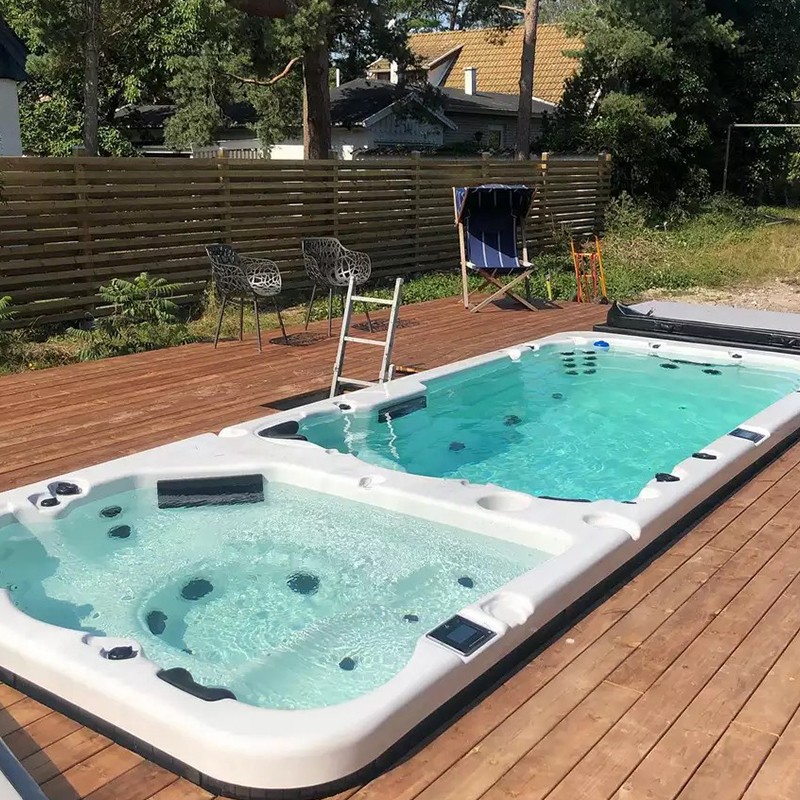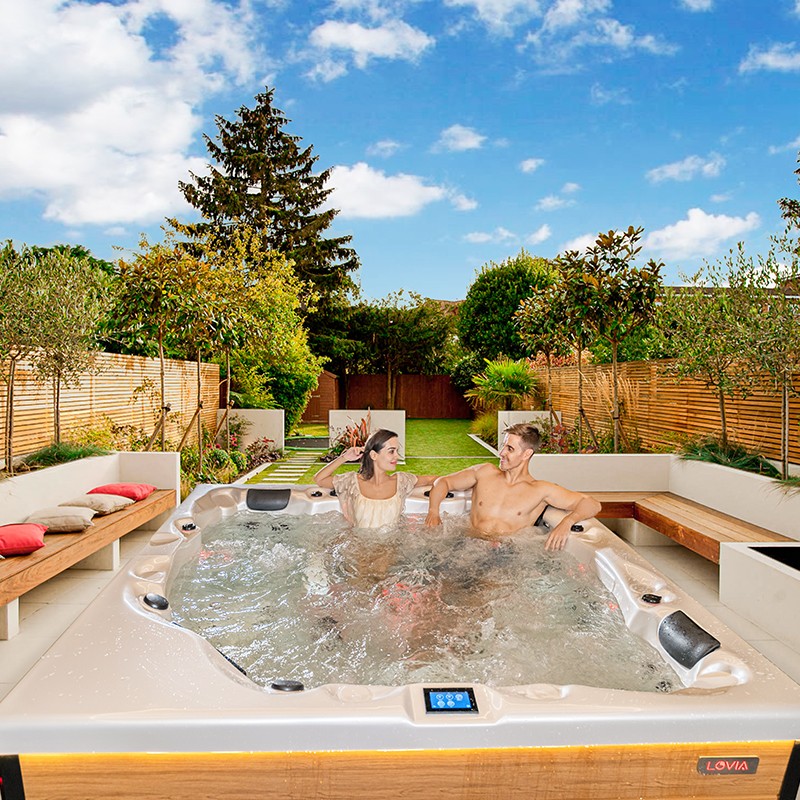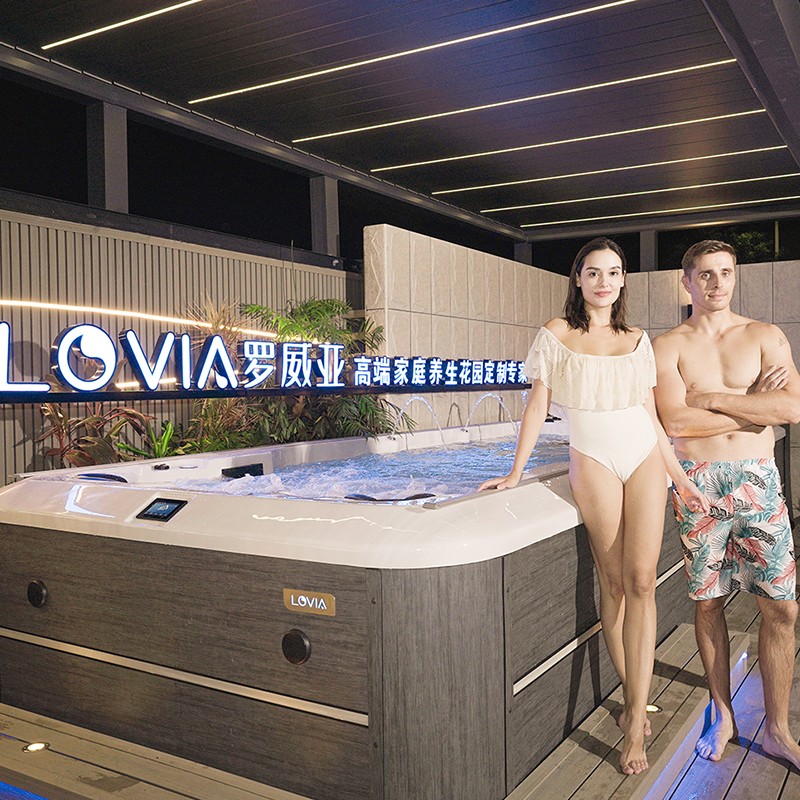
What should not be used in a swim spa?
2025-02-08 15:35Swim spa, as a special water equipment that combines hydrotherapy and sports functions, is increasingly being installed in homes by people to provide multiple functions such as relaxation, exercise and treatment. However, although swim spas are designed to be very durable and powerful, not all items are suitable for use in them. Certain items, if used improperly, may affect the normal operation of the equipment, or even cause malfunctions or safety issues. Therefore, knowing what items should not be put into a swim spa is essential to maintaining the long-term use of the equipment and the health of the water quality.
This article will discuss in detail what items should not be used in a swim spa tub, explain why these items are not suitable for use in it, and provide some safety advice for swim spa users.

Chemicals and Cleaners
1.1 Strong Acid or Strong Alkaline Cleaners
In a swim spa, water quality maintenance is essential, so many people use cleaners or chemicals to keep the water clean and the water quality balanced. However, the use of certain chemicals and cleaners may cause harm to the swim spa tub, especially strong acid or strong alkaline cleaners.
Why is it not appropriate to use strong acid or strong alkaline cleaners?
These cleaning agents are often extremely corrosive and can damage the interior walls, pipes, and other sensitive components of a swim spa. Excessive use of such cleaning agents, especially without dilution, can cause damage to the pool surface and may even affect the equipment's electrical system, causing the pool's pump, heater, and other functions to malfunction. In addition, too much chemicals may cause an imbalance in water quality, which can affect the health of pool users.
Safety Tips:
When using any chemicals, follow the manufacturer's instructions to ensure that they are safe and harmless to water quality and equipment. Specially designed swim spa cleaning agents are recommended, and these products are generally effective in removing impurities without damaging equipment.
1.2 Bleach
Although bleach is a common disinfectant in daily household cleaning, its use in swim spas is absolutely not recommended. Bleach contains chlorine, which may react with other chemicals in the swim spa, destroying water quality, causing equipment malfunction, and may even be a health hazard.
Why is bleach not suitable?
The reaction of the chlorine contained in bleach with other chemicals in the water may produce harmful substances, which may damage water quality and have an adverse effect on pool equipment. For example, bleach can damage a pool's pump, heater, and plumbing system. Prolonged exposure to bleach can also cause corrosion to the exterior surfaces of a swim spa, especially some plastic or rubber materials.
Safety Tips:
Use pool and spa-specific water management products to maintain chlorine levels in the water, rather than household cleaning products such as bleach. If you need to clean the exterior or bottom of a swim spa, choose a mild detergent and non-corrosive materials.

Grease
2.1 Bath Oils, Bath Salts, and Aromatherapy Oils
Many people like to add aromatherapy oils, bath salts, or bath oils to their bathtubs or pools to enhance the spa experience. While these products may help to relax, they are not suitable for use in swim spas.
Why are these greases inappropriate?
Greases not only affect water quality, but can also clog pumps and jets. Bath oils and aromatherapy oils, in particular, contain grease components that easily float in water, which can cause oil accumulation in pump filters and plumbing systems, reduce filtration effectiveness, and make water flow difficult. This not only increases the maintenance workload, but may also cause equipment failure and increase repair costs.
Safety Tips:
If you want to enjoy a relaxing bathing experience, consider using non-oily spa products designed for swim spas. For pool water quality management, choose to use non-oily aromatherapy products, or use natural mineral bath salts that can help maintain water quality.
2.2 Sunscreen and other cosmetics
Many people apply sunscreen or cosmetics before using a swim spa tub to protect their skin from the sun. However, the oils, fragrances and other chemical ingredients in these cosmetics and sunscreens may have a negative impact on water quality.
Why are sunscreens and cosmetics not suitable?
The chemicals in sunscreens and cosmetics may react with other substances in the water, affecting water quality and causing damage to water pumps and filters. In particular, oil-based sunscreens will form an oil film on the water surface, hindering the normal operation of the filtration system, and may even leave sediment in the pipes, resulting in poor water flow and increased maintenance costs.
Safety Tips:
When using a swim spa tub, you can choose oil-free or water-soluble sunscreens and avoid applying cosmetics containing oily ingredients. If you need to apply sunscreen, it is recommended to fully absorb it before entering the water to reduce the impact on water quality.
Food and Beverages
3.1 Food and Beverages
Many people like to enjoy food and drinks next to the swimming pool or hot tub. However, using food and drinks in the swim spa will not only affect the water quality, but may also cause damage to the water pump and filtration system.
Why is it not suitable to use food and drinks?
Food residues and sugars, greases and other substances in drinks may pollute the water quality and increase the difficulty of water maintenance. Food residues entering the water will clog the filter, causing the system to be unable to effectively clean the pool. High-sugar drinks may attract insects or bacteria, thereby accelerating the deterioration of water quality.
Safety Tips:
It is recommended not to bring food and drinks into the swim spa tub when using it. A rest area can be set up next to the swim spa to ensure that food and drinks do not directly contact the pool.

Non-waterproof electronic devices
4.1 Electronic devices (such as mobile phones, speakers)
Although modern swim spas are usually equipped with advanced control panels and entertainment functions, there are still many electronic devices that are not suitable for being placed in the water, such as mobile phones, speakers, etc. Many people like to use electronic devices to listen to music or watch videos while relaxing in the water, but such devices are likely to be damaged or short-circuited if they come into contact with water.
Why are these electronic devices not suitable for use?
Water is the biggest enemy of electronic devices. Water penetration may cause short circuits in the internal circuits of the device and even damage the device. In addition, when electronic devices are used near the swimming pool, the internal components may also be affected by the effect of water vapor, shortening the service life of the device.
Safety advice:
If you want to enjoy the entertainment function in the swim spa tub, you should use waterproof audio equipment designed for use in water to ensure the safety of electronic devices. For mobile phones, tablets and other devices, it is best to place them in a dry area outside the swimming pool.
For quality outdoor wellness solutions, turn to Guangzhou HuanTong Industrial. Founded in 1989, our company has been a pioneer in manufacturing premium spas, hot tubs, and swim spas. We provide an array of customizable spa products designed to meet the highest industry standards, including CE, ETL, and ISO9001 certifications. Whether you're looking to buy in bulk, need wholesale pricing, or want to enjoy promotional discounts, we offer competitive prices without compromising quality. Discover our high-performance products and place your order today.
